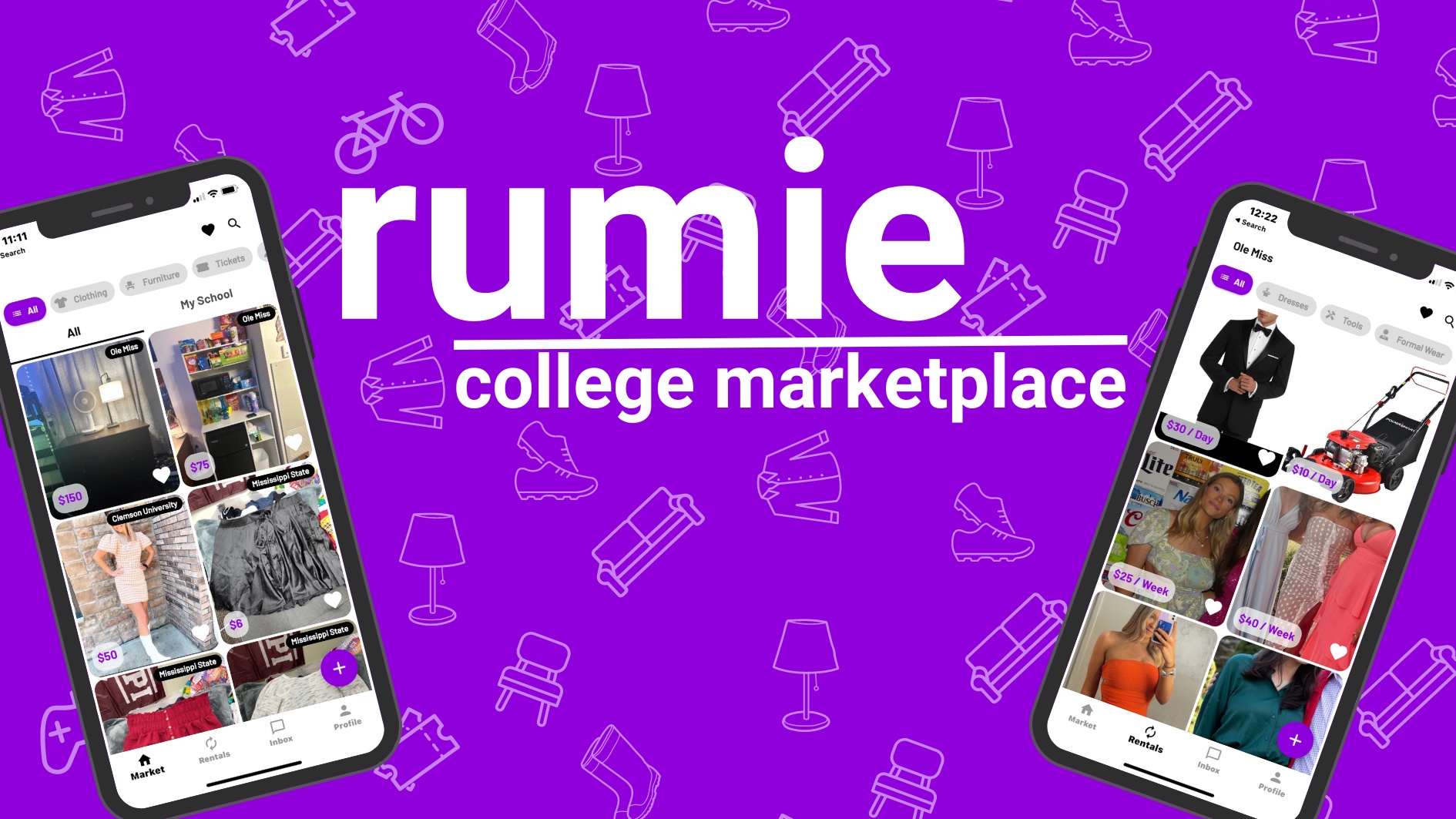Tanner McCraney came up with the idea for the rumie mobile app after an uncomfortable experience via Facebook Marketplace. As a freshman, recently dropped off at his Rhodes College dorm room in Memphis by his parents, he looked around and realized he had a problem—his mother had left him way too many lamps.
His starving-student solution? Sell them on Facebook. But after a shady encounter with a “buyer” who wanted to meet in the back of a Walmart parking lot, McCraney started mulling over the idea of a marketplace designed specifically for college students to buy and sell items—clothes, books, electronics, even lamps—to other college students, right there on campus, for a safer transaction.
“I got to thinking, ‘I’m a student, I’m on campus with a lot of other students, and there’s nothing out there for that,” he said. His research showed that students tried to sell items on Instagram, Snapchat and GroupMe, but none had e-commerce tools to make that work well. He said it took a while for him to get active with the idea, finally teaming up with COO Patrick Phillips in his junior year of college, now at the University of Mississippi, to make a run at developing the project.
Today, McCraney says rumie is the nation’s largest “.edu-only” marketplace, where students can buy and sell within their campus or across college campuses. They’ve had listings on 483 campuses and over 10,000 users on the platform. Their stronghold is in the Southeastern Conference (SEC) and at colleges where they’ve also done on-campus marketing. The goal, however, is to reach all U.S. college students with Rumie; in the short-term, that starts with 15 “fully activated” campuses by early 2024.
Users must have an active .edu email address to sign up for the service. McCraney says that’s like they’re posting a photo of their driver’s license on the site. Rumie can quickly identify a student doing something inappropriate, he says, and refer them to campus authorities. In the current version of the software, students can shop for items on their local campus or “all campuses.” Most transactions take place locally.
While Rumie initially experimented with transaction fees, they no longer charge anything to the student; instead, revenues come from local businesses that advertise to this captive student audience. As the app grows, McCraney believes it’ll be able to entice regional and national sponsors to the platform to increase revenues. And with Rumie 4.0, the upgrade planned before the fall 2023 semester kicks in for most colleges, students can purchase shipping labels to facilitate remote transactions—and Rumie will take a cut of that revenue.
McCraney credits The Center for Innovation and Entrepreneurship at the University of Mississippi for much of Rumie’s success, partly because the Rumie team entered—and lost—their first pitch competition hosted by UM.
“We got smoked,” he said, detailing that he and Phillips had only some slides and drawings while others in the competition were much further ahead. “It lit a fire under us; we wanted to prove those judges wrong.”
After spending the summer of 2021 working on development and working with the CIE team on their business plan and execution—McCraney name-checks Clay Dibrell, Tong Meng and Blake Dubinski—they launched Rumie in Spring 2022, brought on Caki Field to head up their team of ambassadors and got the word out about Rumie, all while re-entering that UM business competition and winning $15,000.
That started the ball rolling. To date, they’ve won $30,000 in competitions and raised $115,000 in a pre-seed round. In 2023, they also received a $100,000 Mississippi Seed Fund award, which McCraney said will take them well into their next software rollout and a national marketing phase.
“We were so excited to get the $100,000 award from Innovate Mississippi, which makes it possible to launch our nationwide marketing strategy,” McCraney said.
The goal is to reach 50-100,000 users by early February 2024, which is the number that national advertisers have told them is the sweet spot for selling campaigns that name brands would be interested in buying. And with the new software version will come a local deals page (to keep that local business advertising revenue flowing), a machine-learning algorithm for recommendations and tools for students to transact across campuses, effectively creating some “cross-nation” engagement for students all over the country.
They’ve grown adoption strategically— Rumie hasn’t spent any more on advertising, focusing instead on ambassadors (who do on-campus events to promote the app) while paying influencers who promote the product on social media. Now, with money in the bank, they hope to light up that strategy.
“We have huge plans for this thing, and we want to see it through,” McCraney said. “We don’t want to stop at being ‘really big in the South.'”

